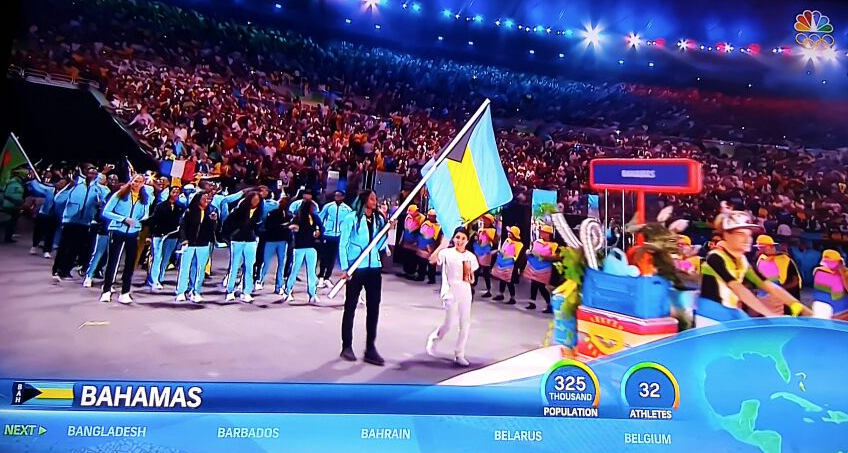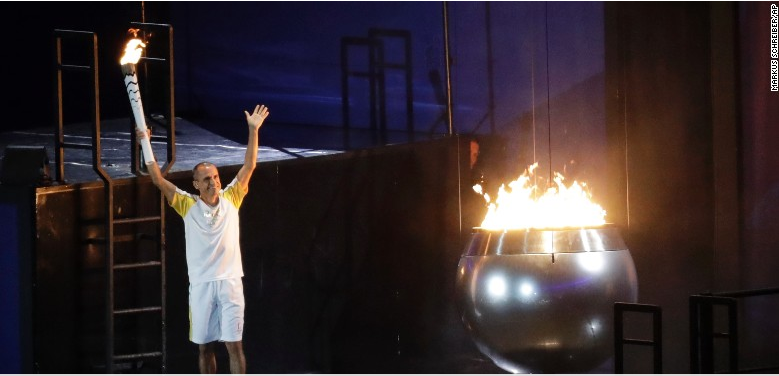The technological wizardry, choreographed precision and sheer grandeur of everything on display during last night’s Opening Ceremony of the 2008 Beijing Olympic Games kept me in such shock and awe that I was staring at the TV even during commercials.
(“Opening Ceremony of Beijing Olympics,” The iPINIONS Journal, August 9, 2008)
With all due respect to London 2012 and Rio 2016, Beijing 2008 remains the gold standard for opening ceremonies. And this is saying a lot considering how renowned Rio is for putting on the annual pre-lent festival of Carnival.
 What made Beijing’s opening ceremony so extraordinary was that it combined the dazzling pageantry of a Rio Carnival with the military precision of a Moscow May Day parade. And let’s face it, apart from the parade of nations, this celebration of Brazilian history, development, and culture showed us little more than Carnival shows us every year.
What made Beijing’s opening ceremony so extraordinary was that it combined the dazzling pageantry of a Rio Carnival with the military precision of a Moscow May Day parade. And let’s face it, apart from the parade of nations, this celebration of Brazilian history, development, and culture showed us little more than Carnival shows us every year.
The homage to samba and other native music was enjoyable. But anyone familiar with American jazz, rock and roll, or rap would not have been too impressed. Hell, even Jamaican reggae would have done more to make me wanna bust a move.
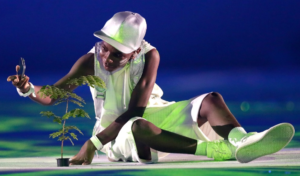 Frankly, if it were not for stunning visuals of Brazil’s natural wonders, this ceremony would not have had much to show.
Frankly, if it were not for stunning visuals of Brazil’s natural wonders, this ceremony would not have had much to show.
I certainly could have done without the patently misplaced lecture on climate change, notwithstanding Brazil’s stewardship of The Amazon. In fact, it is precisely this stewardship that made its lecture reek of hypocrisy – given how much Brazil is polluting its waterways and coastal waters (more below).
And don’t get me started on the mixed symbolism of having a young boy plant a small tree and then flatter himself with a selfie – courtesy of the ubiquitous, energy-sapping smartphone.
Granted, I’m biased – not only because I grew up watching the Carnivalesque Junkanoo parade every year in The Bahamas, but also because the annual Chinese New Year parade rivals Rio’s Carnival in every respect; well, except for Carnival’s female dancers.
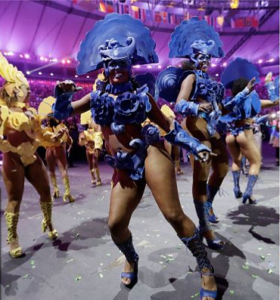 Indeed, I would be remiss not to acknowledge the vaunted attraction of the “tall and tan and young and lovely” girls from Ipanema.
Indeed, I would be remiss not to acknowledge the vaunted attraction of the “tall and tan and young and lovely” girls from Ipanema.
They always feature prominently during Carnival, and did during this opening ceremony too – complete with samba gyrations and twerks to such titillating effect, they made the strutting at Victoria’s Secret fashion shows look G-Rated.
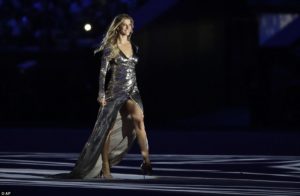 Incidentally, the August 5 edition of Esquire reports that, after the first dress rehearsal, Rio 2016 organizers prevailed upon director Fernando Meirelles to cut the reenactment of a Faginesque robbery, featuring no less a person than supermodel Gisele Bunchen as the victim.
Incidentally, the August 5 edition of Esquire reports that, after the first dress rehearsal, Rio 2016 organizers prevailed upon director Fernando Meirelles to cut the reenactment of a Faginesque robbery, featuring no less a person than supermodel Gisele Bunchen as the victim.
Except that this is rather like portraying American culture but cutting all references to gun violence. What’s more, nothing portrayed Brazil’s Dickensian state of affairs quite like a rich supermodel strutting her stuff among thousands of riffraff-looking extras on this stage; you know, the way rich Brazilians do among millions of favela-dwelling natives in real life. Oh, the irony!
 To be fair, though, the budget for Rio’s opening ceremony was reportedly just a twentieth of Beijing’s. And it showed. But this puts into sobering, if not humbling, perspective roving protests among Brazilians over their government spending billions on these Games, while failing to provide basic public services, including salaries for schoolteachers, firefighters and police. Especially given this:
To be fair, though, the budget for Rio’s opening ceremony was reportedly just a twentieth of Beijing’s. And it showed. But this puts into sobering, if not humbling, perspective roving protests among Brazilians over their government spending billions on these Games, while failing to provide basic public services, including salaries for schoolteachers, firefighters and police. Especially given this:
[Brazil’s then-President Luiz Inácio Lula da Silva] promised Brazilians that the Olympics and the 2014 World Cup would showcase the country as an emerging power on the world stage that could stand shoulder-to-shoulder with the likes of the United States, Western Europe and Russia.
For Brazil, he suggested that day in 2009, the sky was the limit. Now that the Rio Olympics are just around the corner, however, it’s more like the sky has fallen.
(Fox News, August 2, 2016)
Regrettably, there’s no denying that Brazil — the first nation in South America to host an Olympics — has done little to make the region proud. Its plainly shoddy preparations amidst so much chaos have reinforced every negative regional stereotype.
 More to the point, roving protests betray the abiding fact that, far from feeling national pride, the vast majority of Brazilians actually resent hosting these Olympics.
More to the point, roving protests betray the abiding fact that, far from feeling national pride, the vast majority of Brazilians actually resent hosting these Olympics.
One can hardly blame them. After all, these folks have been perennially marginalized. And now they’ve been gentrified and quarantined in squalid favelas to make room for new Olympic venues and related facilities.
When asked if he had bought tickets for the Olympics Marcos Da Costa, 46-year-old, said, ‘I don’t agree with the Olympics while people in Rio suffer violence, bad health services, insecurity and construction works like the poorly-designed cycle path.’
(New York Post, August 2, 2016)
 Not to mention that most Brazilians are likely to enjoy none of the purported legacy benefits. Indeed, like those of so many host cities (notably Munich, Athens, and Sochi), Rio’s Olympic venues seem destined to live on as white elephants or eyesores.
Not to mention that most Brazilians are likely to enjoy none of the purported legacy benefits. Indeed, like those of so many host cities (notably Munich, Athens, and Sochi), Rio’s Olympic venues seem destined to live on as white elephants or eyesores.
Like with most Olympic host nations, the billions of dollars spent on building and hosting these Games were sold to the public as a long-term investment designed to convince tourists it’s a place to visit and convince international business leaders in which to invest…
So far, however, it’s been an unmitigated disaster overwhelmed by pre-Olympic publicity focused on pollution, disease, corruption, traffic, poverty, infrastructure inefficiencies and general discord.
‘If [hosting the Olympics were] about changing perceptions of Brazil it would appear to have backfired in a serious perceptual sense,’ [said] Mark Ritson, adjunct professor at Melbourne Business School in Australia and an international branding expert.
(Yahoo Sports, August 2, 2016)
 Mind you, Brazilians need only look at the poisoned chalice Athens 2004 turned out to be for the Greeks. After all, the debt hangover from those Games not only triggered the EU financial crisis of 2010, but austerity measures to service that debt have many once-proud, middle-class Greeks now living like favela-dwelling Brazilians.
Mind you, Brazilians need only look at the poisoned chalice Athens 2004 turned out to be for the Greeks. After all, the debt hangover from those Games not only triggered the EU financial crisis of 2010, but austerity measures to service that debt have many once-proud, middle-class Greeks now living like favela-dwelling Brazilians.
Meanwhile, we’ve been treated to the quadrennial handwringing about all kinds of issues threatening to plunge the Games into turmoil, or worse. Terrorism always looms most ominously in this respect, and completion of venues and transportation infrastructure are mainstays. But political chaos, street crime, and Zika concerns are presenting acute challenges in Rio.
 I addressed these challenges in such commentaries as “Political Chaos in Brazil Makes Zika Virus Least of Pre-Olympics Woes,” April 8, 2016, and “Withdrawing from Olympics Over Zika a Betrayal of Olympic Spirit and National Pride,” July 2, 2016.
I addressed these challenges in such commentaries as “Political Chaos in Brazil Makes Zika Virus Least of Pre-Olympics Woes,” April 8, 2016, and “Withdrawing from Olympics Over Zika a Betrayal of Olympic Spirit and National Pride,” July 2, 2016.
Yet all such issues invariably turn out to be much ado about nothing. And I have no doubt that, once competition begins, all issues in Rio will be flushed into its sewage-infested waterways, where it seems every other kind of waste ends up.
 Which compels me to note that, despite Brazil promising seven years ago to decontaminate them, these infamous waterways remain “unfit” for all outdoor aquatic events – from long-distance swimming to sailing.
Which compels me to note that, despite Brazil promising seven years ago to decontaminate them, these infamous waterways remain “unfit” for all outdoor aquatic events – from long-distance swimming to sailing.
Just days ahead of the Olympic Games the waterways of Rio de Janeiro are as filthy as ever, contaminated with raw human sewage teeming with dangerous viruses and bacteria, according to a 16-month-long study.
(Associated Press, August 1, 2016)
Imagine the manifest absurdity, to say nothing of the health risks, of Olympic officials instructing swimmers and sailors to keep their mouths shut to avoid ingesting any of the contaminated water they’re competing in.
Having said all that, I always watch the opening ceremony primarily to take jingoistic pride in the few seconds it takes to show Team Bahamas marching by in the parade of nations.
But this part of the ceremony held added suspense this year. It had everything to do with watching disgraced Team Russia march under a cloud of doping suspicion, which will hang over every one of its athletes during these Games.
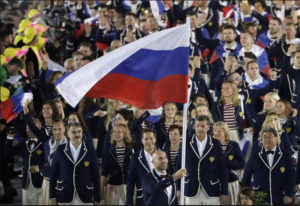 Far from sharing in the Olympic spirit, every Russian athlete must have felt like the proverbial skunk at a garden party – complete with every non-Russian athlete greeting them with a mixture of simmering contempt and restrained derision.
Far from sharing in the Olympic spirit, every Russian athlete must have felt like the proverbial skunk at a garden party – complete with every non-Russian athlete greeting them with a mixture of simmering contempt and restrained derision.
Russia will be represented in most sports at the Rio Olympics, with 271 of its sportsmen and women cleared to participate ahead of the opening ceremony…
Russia’s depleted team will comprise about 70 percent of the 387-strong squad originally named for the Games…
The IOC chose not to impose a blanket ban on all Russian athletes at a meeting in July, but directed sports federations to allow them to compete if they met a set of criteria, including a clean doping past and sufficient testing at international events.
(Reuters, August 4, 2016)
I commented on this scandal in “IOC Failure to Ban Russia Proves It’s in Putin’s Pocket,” July 25, 2016. But the Russian athletes might’ve derived some consolation, if not a chuckle, from the 500-plus members of Team USA marching in uniforms, courtesy of Ralph Lauren, that looked more like an homage to the Russian than the American flag. But at least these uniforms were ‘made in the USA’ – as opposed to the uniforms he tailored for Beijing 2008 and London 2012, which were ‘made in China.’
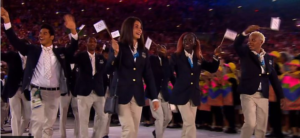 Yet the dismaying implications of Team Russia’s doping pale in comparison to what it says about the state of world affairs that, for the first time in Olympic history, the parade of nations featured a Team Refugee. It is composed of refugees from such war-ravaged countries as Syria, South Sudan, and the DR Congo.
Yet the dismaying implications of Team Russia’s doping pale in comparison to what it says about the state of world affairs that, for the first time in Olympic history, the parade of nations featured a Team Refugee. It is composed of refugees from such war-ravaged countries as Syria, South Sudan, and the DR Congo.
Which is why the heartwarming from seeing them on parade was surpassed only by the heartrending recognition of what it took for them to be marching under the Olympic flag, instead of the flag of their respective countries.
 On the other hand, given that Michael Phelps is the most decorated Olympian of all time, I would be remiss not to share this:
On the other hand, given that Michael Phelps is the most decorated Olympian of all time, I would be remiss not to share this:
U.S. Olympic team flag bearer Michael Phelps is not going to stay for the duration of Friday night’s opening ceremony, as almost every other athlete will, but instead will be whisked out by NBC staffers and driven back to the Olympic Village…
As a swimmer who often had to compete the next day, Phelps had not marched in the opening ceremony in his previous Olympic Games from 2000-2012…
Phelps does not compete Saturday during the first day of the swimming competition, but will be participating Sunday night in the U.S. men’s 4×100-meter freestyle relay.
(USA Today, August 5, 2016)
Except that I remember well how Phelps shocked the world in 2012 when, despite foregoing the opening ceremony to rest, he failed to even medal in his first event. I not only warned it would be thus, but suggested Phelps would be well-advised to skip it:
He faces an heir apparent in fellow American Ryan Lochte who seems determined to be a spoiler. And I think he will be … in their very first head-to-head competition: the 400m Individual Medley. Not just because this was the only event Lochte won in their head-to-head competition at the trials; but because, even though he can sustain his speed and stamina over 200 meters, Phelps’s (relatively) lazy approach to training over the past four years means that he simply cannot sustain it for the 400.
Considering that a defeat at the outset in this energy-sapping and potentially ego-deflating event could ruin his chance at gold in every other event, it would not surprise me if Phelps decides to withdraw.
(“Olympic Trials: Preview of Exciting Feats to Come,” The iPINIONS Journal, July 2, 2012)
Evidently, he learned the hard and humiliating way that it’s clearly better, in the retiring stage of his career, to skip this event (aka the decathlon of swimming) and march. Indeed, it is a testament to this inevitable humiliation that Lochte – who is also in the retiring stage of his career – did not even survive last month’s U.S. trials in this event, which would have at least given him a chance to defend his Olympic title.
Finally, the lighting of the Olympic cauldron is usually a very special moment, if not the highlight, of opening ceremonies. No doubt you recall Muhammad Ali doing so for Atlanta 1996 and being propped up in Weekend-at-Bernie’s fashion for London 2012.
But, with all due respect to Ali, my favorite lighting was for Barcelona 1992, when archer Antonio Rebollo lit the Olympic cauldron by firing a torched arrow over it from about 1,000 meters away. That remains the gold standard for lighting the Olympic flame. And it might explain my curious enjoyment of the Archery events at every Olympics since….
 Of course, Pele would have rivaled Ali’s sheer star power if he were the one lighting the cauldron tonight. Unfortunately, health issues, which should have kept Ali from an encore appearance in London, prevented Pele from doing so in Rio.
Of course, Pele would have rivaled Ali’s sheer star power if he were the one lighting the cauldron tonight. Unfortunately, health issues, which should have kept Ali from an encore appearance in London, prevented Pele from doing so in Rio.
But, given that Soccer is Brazil’s national sport, one of its stars could have one-upped that archer by kicking a fireball over the cauldron to light the Olympic cauldron.
Instead, much lesser known Tennis player Gustavo Kuerten, Basketball player Hortência Marcari, and marathon runner Vanderlei Cordeiro de Lima ended the global Olympic torch relay – with Cordeiro de Lima lighting the cauldron in very traditional style. Ah well….
Let the Games begin!
NOTE: NBC’s commercially motivated tape delay irritated me beyond words. Thankfully, many online sites provided live commentary – complete with spectacular pictures.
Related commentaries:
IOC failure…
Political chaos…Zika…
Withdrawing over Zika…
Rio Opening Ceremony…
Olympic trials…
* This commentary was originally published yesterday, Friday, at 11:43 p.m.
